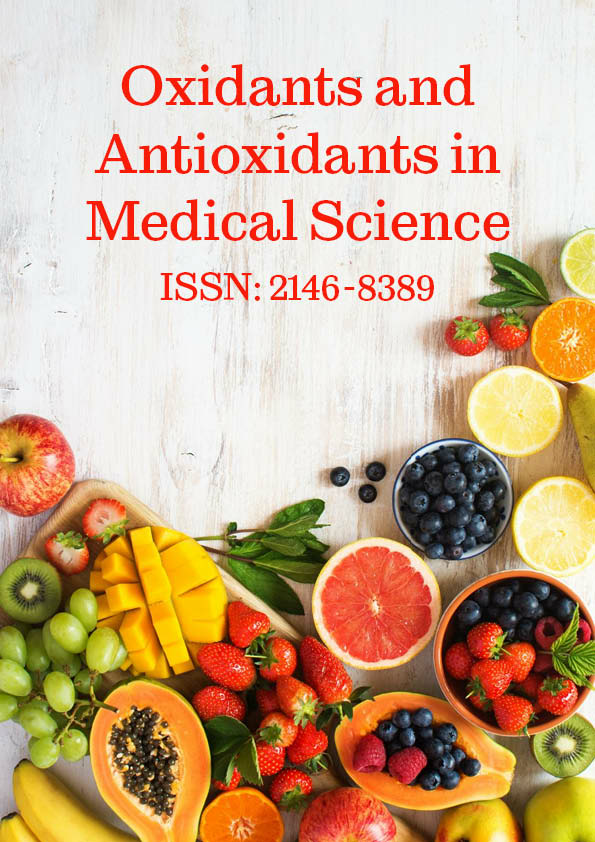Perspective - Oxidants and Antioxidants in Medical Science (2022)
Role of Antioxidants in the Treatment of Rheumatoid Arthritis
Nikh Haedi*Nikh Haedi, Department of Chemistry, Universty of Hardvard, Cambridge, USA, Email: Nakeidh@gmail.com
Received: 26-May-2022, Manuscript No. EJMOAMS- 22-64823; Editor assigned: 28-May-2022, Pre QC No. EJMOAMS- 22-64823 (PQ); Reviewed: 11-Jun-2022, QC No. EJMOAMS- 22-64823; Revised: 16-Jun-2022, Manuscript No. EJMOAMS- 22-64823 (R); Published: 27-Jun-2022
Description
Rheumatoid arthritis is a chronic inflammatory disease of unknown aetiology that affects about one percent of adults worldwide. Symptoms of the disease are progressive inflammation of the synovium of the joints, leading to the destruction of the surrounding bone and cartilage and ultimately paralysis of the joints. Free oxygen radicals (e.g., superoxide and hydrogen peroxide) have been implicated as mediators of tissue damage in rheumatoid arthritis, as well as proinflammatory cytokines, particularly tumour necrosis factor-α. Free radical oxidation products have been identified in the synovial fluid of patients with rheumatoid arthritis, and these products are thought to be produced by activated macrophages, monocytes, and granulocytes, as well as possible anoxic reperfusion reactions that may occur in the affected organs. Antioxidant micronutrients play an important role as part of the mechanism that protects tissue damage caused by active oxygen species.
Dietary supplements and antioxidant foods have long been recommended for the treatment of Rheumatoid arthritis, Osteo Arthritis and other inflammatory arthritis. However, the importance of antioxidants in preventing and treating a wide range of serious illnesses including stroke, cancer, diabetes, cataracts and Parkinson’s disease etc.
In RA, active forms of oxygen and other free radicals are associated with the inflammatory process in many ways. These include the role of nitrous oxide in regulating vascular tone, superoxide in fibroblast enlargement and hydrogen peroxide in the regulation of cytokines IL-2 and TNF-α. During inflammation, oxidation converts low-density lipoproteins, inactive α-1-protease inhibitors, damages DNA and causes lipid peroxidation. Reactive oxygen species also damage the cartilage and extracellular matrix and inhibit collagen and proteoglycan synthesis. Evidence
that increased oxidative stress or deficient antioxidant status are important in the pathogenesis of RA comes from several studies. Epidemiological studies have shown that low intake of dietary antioxidants is associated with the incidence of RA. Furthermore, animal studies have demonstrated an anti-inflammatory role for some antioxidants including Superoxide Dismutase and vitamin E in experimentally induced arthritis.
Fruits are delicious by nature, and many provide high levels of antioxidants, fiber, vitamins, minerals, and other nutrients. Some contain nutrients that can help reduce inflammation associated with arthritis and other serious conditions, such as heart disease and stroke. All fruits have health benefits, but some have more disease-fighting properties than others. For example, berries are among the best fruits of arthritis. They are full of antioxidants, such as ascorbic acid (a type of vitamin C) and anthocyanin’s and carotenoids, which give the berries a deeper colour. These compounds also help rid the body of free radicals that promote inflammation and help prevent heart disease and certain cancers. Different types of antioxidants used in the treatment of rheumatoid arthritis. They are:
Tart cherries
Tart cherries get their dark red colour and many powerful anti-inflammatory and antioxidant benefits from the flavonoid anthocyanin.
Strawberries: Strawberries are naturally sweet and have more vitamin C in the diet than oranges. Vitamin C can reduce the risk of gout, high blood pressure and cholesterol problems.
Grapes: Both white and black grape varieties are a good source of beneficial antioxidants and other polyphenols. “Fresh red and black grapes also contain resveratrol, a healthy combination of red wine that contributes to heart health by improving cardiovascular function.
Copyright: © 2022 The Authors. This is an open access article under the terms of the Creative Commons Attribution NonCommercial ShareAlike 4.0 (https://creativecommons.org/licenses/by-nc-sa/4.0/). This is an open access article distributed under the terms of the Creative Commons Attribution License, which permits unrestricted use, distribution, and reproduction in any medium, provided the original work is properly cited.







